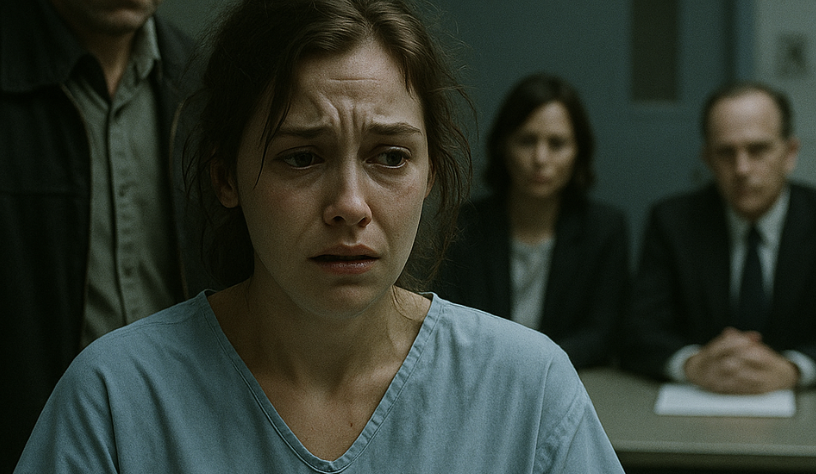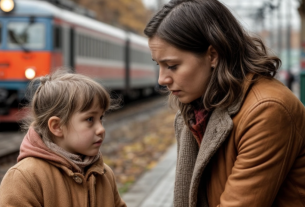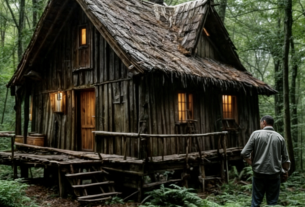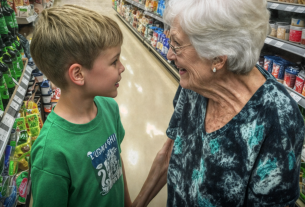“Finally,” I breathed out as the key turned in the lock.
Viktor entered the apartment, dropped his travel bag on the floor, and wearily ran a hand over his face. Six months on a work rotation, six months I hadn’t seen him.
He smelled of the train, dust, and a foreign city. I wanted to throw myself around his neck, but one of the babies was sleeping in my arms, and the other started crying in his crib.
“What the…” Viktor froze in the doorway, his gaze darting from one crib to the other. “Anya, what is this?”
I smiled nervously, rocking my son in my arms. My heart raced — I had rehearsed this scene so many times, so wanted him to be happy. “A surprise. We have twins. Boys.”
He was silent. Didn’t come closer, didn’t look at the sleeping children’s faces. His face, hollowed from the trip, slowly turned stone cold. He looked at the two cribs like they were two blast craters.
“Surprise?” he repeated in a dull voice. “You call this a surprise? We agreed on one. I was counting on one.”
“Vitya, it happened this way. Is that bad? These are our children. Double happiness.”
“Happiness?” he sneered, and that laugh sent a chill crawling over my skin. “I worked my ass off in the north for six months not for ‘double happiness.’ I worked so we could pay off the mortgage, so I could finally buy myself a car. Not to get shackled for the next twenty years with double the burden.”
His voice grew louder, metallic.
“Did you even think about me? Did anyone think about me? When will I start living for myself? I had plans, Anya! I had plans!”
Tears welled up in my eyes, but I stubbornly swallowed them.
“Our plans now — they are these,” I nodded toward the boys.
Viktor turned away and looked out the window. I saw his tense nape, his shoulders tight. He wasn’t looking at me, not at the children. He was looking at his shattered dream of a free life.
“No,” he cut in sharply, turning around abruptly. “Those are your plans. You gave birth to two? Then you raise them. I’m leaving. I want to live for myself.”
He didn’t shout, he said it evenly, matter-of-factly — and that made his words even more piercing.
He went to the wardrobe, yanked the door open, and started pulling out his things, throwing them into the travel bag on the floor. T-shirts, jeans, sweaters — everything flew mixed together.
“Vitya, wait, what are you doing? Think it over!” I took a step toward him but stopped, afraid to wake the baby.
“You think it over,” he tossed over his shoulder. “I didn’t sign up for this.”
He zipped the bag, picked it up, and without looking at me, headed for the exit. I stood in the middle of the room, stunned, holding the warm, snoring bundle, while the other little bundle began crying in his crib. The door slammed.
I collapsed onto the bed, my legs gone numb. For several minutes, I just stared at one spot, listening to the baby’s cries. Then I slowly took out my phone and dialed.
“Mom?” I whispered into the receiver. “Can I… can we come to you? For good.”
The village greeted us with the smell of wet earth and smoke from stove chimneys. The parental home, rooted in the ground with a low lintel that my father always joked about, became our fortress.
The city apartment with its mortgage bills and dashed hopes belonged to a different, crossed-out life. Here, time flowed differently. It was measured not by city clocks but by sunrises and sunsets, the first frosts, and spring mud.
Kirill and Denis grew like two young trees — strong, a little wild, indistinguishable to strangers but completely different to me. Kirill, more silent and steady, absorbed everything from grandpa.
At ten years old, he already knew how to handle a plane, how to stack firewood so it wouldn’t get damp, and could tell by sound which tool had dulled.
Denis was his shadow and his voice — quick, playful, with perpetually skinned knees.
He was the first to climb the tallest apple trees, the first to start fights with village bullies, and the first to figure out how to make something that could move on its own from an old bicycle and a mower engine.
“Mom, look!” he shouted, racing across the yard on his noisy contraption, while Kirill ran behind with a screwdriver, ready to fix any inevitable breakdown.
I worked at the local school, teaching several subjects and taking home tests to grade. Money was tight. Sometimes, in the evenings, checking notebooks under the dim lamp light, I caught myself wondering: what if Viktor had stayed?
Would we be living in the city now, taking the kids to clubs, going on seaside vacations? I pushed those thoughts away. They were poison, slowly poisoning the present. My present was here — in the creak of floorboards, the smell of wood shavings from grandpa’s workshop, in two pairs of identical boots by the door.
One winter, during a particularly fierce blizzard, the old window frame in the boys’ room gave way. There was a dull crack, and an icy wind burst inside, throwing the curtain to the floor along with a snow swirl.
The boys, awakened by the noise, huddled in the doorway, staring at the hole in the window.
“It’s okay,” grandpa said, entering with a flashlight. “We’ll figure something out. For now, we’ll board it up with plywood and think in the morning.”
In the morning, he brought an old frame from the shed.
“Well, guys,” he said, laying it on the workbench. “Time to learn. A window is the eyes of the house. And they must be clear and strong.”
All day, the three of them worked in the workshop. Grandpa showed them how to remove old glazing beads, carefully clean the grooves, and measure the glass precisely. Kirill listened, holding his breath, repeating every move with amazing accuracy.
Denis spun nearby, handing tools and chatting nonstop, but his eyes shone with the same enthusiasm. By evening, the new, if clumsy, window was in place.
“Looks great,” Denis breathed, looking through it at the snowy garden. “Even better than the old one.”
“Yeah,” Kirill nodded, running his finger along the smooth seam. “When we grow up, we’ll open our own company. And we’ll make windows that no wind can break. The best in the whole region.”
I stood in the doorway listening to them. For the first time in years, I felt not just acceptance of fate but a sharp, burning pride. They would manage. Without him. They already were.
Almost thirty years passed. The dust of time dulled the edge of old wounds but didn’t erase the scars.
From our and grandpa’s beginnings, from that first awkwardly inserted glass pane, grew the company “OknaStroyGarant.” Now that name was known throughout the region. Kirill became its brain — calm, thoughtful, negotiating deals, signing contracts, and developing new technologies.
His office was a model of order. Denis was its heart and engine — he managed production and installation teams, ran between sites, could single-handedly lift a heavy glass unit in a bet with workers, and had an incredible knack for people.
They were still one whole, two sides of the same coin.
I had long moved out of my parents’ house into a small home the sons built for me next to their large two-family cottage. I stopped working at the school and helped Kirill with paperwork and the daughters-in-law with the grandchildren.
I looked at my sons, at their strong families, at their business built from scratch, and felt calm, full pride. The story with their father had become a distant, almost unreal legend from another era.
One day, as usual, I stopped by their office with homemade lunch — roast chicken and vegetable salad. Denis, as always, grabbed the containers right from me in the hallway.
“Oh, Mom, savior!” he boomed. “We’re swamped today, barely time to eat. We’re hiring a new crew, Kirill’s been interviewing candidates for three hours.”
I peeked into Kirill’s office. He sat behind his huge desk, and across from him, slumped in a visitor’s chair, sat an elderly, thin man in a worn jacket.
I couldn’t see his face, only the graying back of his head and his restless hands that couldn’t find rest. Something about his figure, the way he held his shoulders, seemed vaguely familiar.
“…have experience,” his muffled voice reached me. “Worked everywhere — construction, the north in my youth… Life tossed me around.”
Kirill answered something, and the man stood up, turning toward the door. Our eyes met for a split second. The world tilted. It was his face. Viktor’s face.
Distorted by time, covered with a network of wrinkles, with dull eyes but unmistakably his. The man who thirty years ago wanted to “live for himself” now came asking for a job from the children he abandoned, to earn his living.
I staggered back into the hallway, pressing my hand to my mouth to keep from screaming. My breath caught. Denis noticed my state and ran up to me. “Mom, what’s wrong? Are you okay?”
I couldn’t speak. I just pointed with a trembling finger at the office door, from which Viktor had already come out and, not recognizing me, shuffled down the corridor toward the exit.
That evening, the hardest conversation of my life took place. The three of us sat in the living room of my house.
The boys listened silently, their faces, so different, now strikingly alike — frozen in the same tense, icy expression.
I told them everything. About his leaving, about his last words. About how I saw him today.
“We took him,” Kirill said quietly when I finished. “As an installer. Tomorrow is his first day. The surname… I noticed, but there could be coincidences.”
“And now what?” Denis asked, looking not at me but at his brother.
“Nothing,” Kirill replied. “Tomorrow we’ll talk with him.”
The next day, they called him to the meeting room. I insisted on being there. I wanted to see everything with my own eyes.
We sat at a long table: me and my two sons, owners of a prosperous company. Viktor entered. He was in a new uniform with the company logo.
Seeing me, he frowned, trying to remember, but his memory held nothing.
“Please sit, Viktor,” Kirill said evenly, pointing to the chair opposite.
Viktor sat, looking curiously and obsequiously at the young bosses. “Viktor,” Kirill began, slowly shuffling papers. “We didn’t get to discuss everything yesterday. Do you have a family? Children?”
Viktor coughed, averted his gaze.
“No. Didn’t work out. Been alone all my life. Devoted myself to work, bounced around for earnings.
I lost my health but gained nothing. Wanted to live for myself, you know… but it turned out I didn’t live at all.”
“I understand,” Denis nodded, and there was not a shred of sympathy in his voice. “You had plans, probably. To buy a car, to relax.
And here comes the daily grind, responsibility. Especially if a child was born. Or, God forbid, twins. That would be a real burden, huh?”
Viktor flinched at these words and for the first time looked at Denis truly attentively. Then shifted his gaze to Kirill.
To me. His lips trembled, his face slowly turned pale, taking on an earthy hue. Recognition overwhelmed him like a wave, drowning him, taking his breath away.
“You…” he croaked. “Anya? And you…”
“We’re your sons,” Kirill finished for him. His voice was calm, like the surface of a frozen lake, but beneath that smoothness lay the weight of a thirty-year winter.
“The very ones you ran away from to ‘live for yourself.’ So, how was that?”
Viktor sank into the chair. He clasped his head with his hands, rocking side to side. “Guys… sons… I… I didn’t know… I thought…”
“No need,” Denis interrupted. He stood and walked to the huge panoramic window overlooking the production hall. “Look there. We built all this.
Without you. We grew up while you were ‘finding yourself.’ We studied, worked, fell and got up. We built this factory, these houses, created our own families. Those are our plans. The ones you once called a burden.”
Kirill also stood.
“We won’t fire you. And we won’t seek revenge. We just wanted you to see it. Once. Now leave. Take your one day’s salary and leave. And never show up in our lives again.
You’re an outsider in it.”
Viktor looked at them with eyes full of tears, horror, and belated remorse. He wanted to say something but found no words. Silently he stood and, staggering like a drunk, left the meeting room. The three of us remained standing by the window. Outside, work was buzzing, machines humming, forklifts scurrying.
Someone’s new, strong, and bright life was being built there. And the old ghost was banished forever. We didn’t need his revenge or forgiveness. Our victory was different. It was within ourselves.



